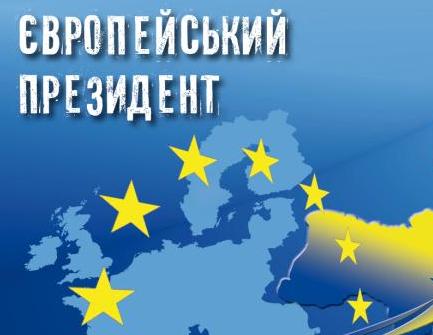The Institute of World Policy presented the results of the “European President” survey on the 19th of May, 2014.It is an expert evaluation of main candidates for the presidency concerning their ability to bring Ukraine closer to the European Union and, in particular, to become political guarantors of the implementation of the Association Agreement with the EU.
During the event IWP Director Alyona Getmanchuk and journalist Sergij Sydorenko presented a publication with the results of the survey and infographics that reflects Europeanness ranking of candidates to the presidency.
{12}
Chair of the Supervisory Board of the IWP Victor Shlinchak, candidate for President of Ukraine Petro Poroshenko and director of the IWP Alyona Getmanchuk
The event was attended by the presidential candidates Petro Poroshenko and Olga Bogomolets, leading Ukrainian experts, and diplomats from the EU member states.
{10}
The total score has proven a winner — Petro Poroshenko, with the result of 10.83 points, took the first place. Anatoliy Grytsenkois in second place (7,76). He is second according to most estimation parameters. Yulia Tymoshenkoand Olga Bogomolets have jostled for the third position. On the side of the first one, there are her experience and professional election program in terms of understanding of European integration processes. At the same time, in other nominations, the ex-prime minister has scored significantly less than her rival. Experts believe that Tymoshenko resorts to black PR and that she has non-European “way of thinking, political culture and behaviour” (for this indicator Tymoshenko has got -0.38 points, and Bogomolets +0.82).
The full text of the publication in English is here.
{2}
Olga Bogomolets, candidate for president of Ukraine
{8}
Journalist, expert on the European integration Sergiy Sydorenko
Chair of the Supervisory Board of the IWP Viktor Shlinchak awarded diplomas to the candidates. Poroshenko thanked the Institute of World Policy for the initiative and made a special gift. It was a flag of the European Union, with which Ukrainian leaders of civil society and politicians had demanded to sign the Association Agreement with the EU at the summit of “Eastern Partnership” in Vilnius.
{13}
{1}
{3}
Deputy Director of the IWP Serhiy Solodky and editor-in-chief of the newspaper “The Day” Larysa Ivshyna
{4}
Senior Program Office UNITER, Pact Yulia Yesmukhanova and Director of the Fund “Democratic Initiatives” Irina Bekeshkina
{5}
Ambassador of Finland to Ukraine Arja Makkonen and member of the Ukrainian Parliament Iryna Gerashchenko
{6}
Ambassador of Sweden to Ukraine Andreas von Bekerat and the expert of the European Council on Foreign Relations Andrew Wilson
{11}
Several important components have been taken into account for ranking the candidates.
• The IWP has turned to experts in the field of European integration, profile journalists and Western experts familiar with the Ukrainian politics, to express their opinion about candidates. 80 completed questionnaires have been received;
• The IWP has analysed programs and election rhetoric, finding out whether the candidate understands that the European integration requires not a mere promise “to join the EU as early as tomorrow”, but a complex of reforms;
• The IWP has studied the candidate’s attitude towards European issues in the past;
• Finally, we have personally asked the candidates to answer a questionnaire, which contains 17 test, indicative questions.
The IWP has chosen 8 the most popular candidates out of 23 registered by the Central Election Commission – those, who, according to the results of social polls, at the time of the launch of the project, have a chance to overcome the so-called psychological barrier of 4%. This list includes Petro Poroshenko, Yulia Tymoshenko, Sergiy Tigipko, Mykhailo Dobkin, Petro Symonenko, Oleh Lyashko, Anatoliy Grytsenko and Olga Bogomolets.
The “European president” project was implemented within the framework of the IWP project “New European policy” and with the support of the “Ukraine National Initiatives to Enhance Reforms” (UNITER) project funded by the United States Agency for International Development (USAID) and Pact in Ukraine.
News

IWP Named Presidential Candidate who Сould Bring Ukraine Closer to the EU
04:09 PM 19-5-2014



Comments theme
Comments themeComments themeComments themeComments themeComments themeComments themeComments themeComments themeComments themeComments themeComments themeComments themeComments themeComments themeComments themeComments themeComments themeComments themeComments themeComments.